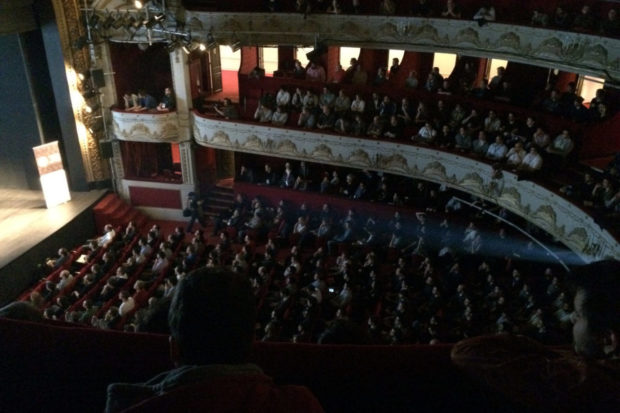
By Alfonso C. Hernandez
In the current world of music and theater, directors, producers, set designers, costumiers and choreographers appear to think that presenting a work of art as originally created by artists, composers and playwrights might not appeal to today’s audience; therefore, they change and mix styles to create a more entertaining product.
In the last broadcast of Direct from the Met of Handel’s Giulio Cesare, Caesar and the Roman soldiers are dressed as British imperialists of the late l9th century with bright uniforms and the Egyptians are in a variety of costumes of Indian, Moroccan and Asian exotic styles. Wonderful to look at, and yet, what overwhelms the audience is the performances of Nathalie Dessay as Cleopatra, David Daniels as Caesar, Christophe Dumax as Ptolemy and Rachid Ben Abdeslam as Nirenus.
Three countertenors and a coloratura assoluta make this production the performance not to miss this year. Dessay dances complicated dances as she sings the role to perfection. Patricia Bardon as Cornelia and Alice Coote as Sextus, in the second story of the plot and who suffer under Achillas, sung by Guido Loconsolo, are also outstanding.
Julius Caesar by Shakespeare, directed by Sarah Gallegos and Chris Mangels at College of the Sequoias, freely adapted by Mangels, fares not as well as the opera. Set in what appears in a mafia environment, in Rome, with male actors in tuxedos gives one the impression that such Rome is actually some club in a place such as Las Vegas. To create some contemporary ironic commentary, several music measures of songs sung by Frank Sinatra are heard intermittently between scenes. The worst of this irony is when Caesar decides to go to the Senate, knowing that this is the “Ides of March,” one hears “Call Me Irresponsible.”
Fortunately, many of the well-known lines of the play were well said by actors like Robert Langarica as Brutus, Adam Rodriguez as Mark Anthony and David Rasner as Caesar. It might have been more effective to set the play in Juarez or Tijuana, Mexico, so that the revolver fight had more relevance and point out the violence happening south of the border.
The Fresno Grand Opera presented Candide by Leonard Bernstein, with music direction by Curtis Tucker and stage direction by Joseph Bascetta. Lukas Cerny’s choir performed multiple roles. This Candide was well sung by John Pickle as Candide, Maureen Francis as Cunegonde and Patric Jacobs as the narrator, Panglos and the Sage. I still remember, however, the Candide at Fresno State directed by E. Emmanuel and Steve Lamar in the title role.
The most ambitious and courageous production currently in the area is Force of Nature by Steven Deitz directed by Elicia Russell and produced by the Visalia Players. Freely adapted from J.W. Goethe’s Elective Affinities, published in 1809, adapted by Dietz to 1908 Germany, and presented in Visalia with a surprising mix of styles, including shorts and tennis shoes, Force of Nature presents several still shocking ideas such as destiny, free will and passions of the heart undermining the sacred institution of marriage.
Elective affinities mean really chemical affinities that determine human relationships governed by the laws of chemistry. Force of Nature is a play of manners and a metaphor for marriage where adultery and divorce are practically the norm. Excellent in this production were Thomas Crowe as Eduard and Christopher Shepard as the Captain. Like in Julius Caesar at College of the Sequoias, the actors were too young or too old for their parts, fault they overcame with their talent.
Finally, the Tulare County Symphony Orchestra directed by Bruce Kiesling thrilled us with the Symphony No. 1 in D major by Gustav Mahler, composed in 1887 and 1888. Although the division of movements tells us how to play each one, it does not explain the meaning of the Titan Symphony. The first movement, made up of short staccato sounds, appears as the discovery of sound, while the second relates to the style of music at the time of composition. The third movement shows some of his musical influences and the last has the power of prophecy, as if Mahler had foreseen the tragic years to come in the next century.
*****
Alfonso C. Hernandez is a writer and poet from Three Rivers, Calif. Contact him at alfonsochernandez@hotmail.com.
